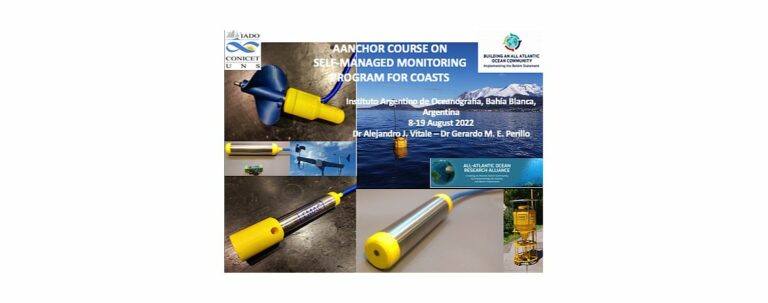CALL FOR CANDIDATES – COURSE ON SELF-MANAGED MONITORING PROGRAM FOR COASTS
Instituto Argentino de Oceanografía, Bahía Blanca, Argentina 8-19 August 2022
We open registration for a short (two-weeks), intensive course on the development of an integrated network employing self-constructed, low-cost sensors and platforms. The course is open to candidates from countries within the All-Atlantic Ocean Research Alliance (EU 27, South Africa, Marocco, Cabo Verde, Brasil, Argentina, USA, Canada).
This course is part of the All-Atlantic Marine Research Infrastructure Network (AA-MARINET) Joint Pilot Action, which will provide tools to support a transatlantic network of Research Infrastructures initiatives, promoting Trans-National Access and other methods for sharing infrastructures in the Atlantic area.
Objectives
– To help develop an integrated network of low-cost monitoring stations around the Atlantic
– To train young professionals and advanced graduate students
- to develop their own low-cost sensors and platforms
- to replace and repair simple sensors
- to manage and analyse time series data
General Information
The course is focused on providing the participants with the capacity to build their own basic sensors and platforms as well as to be able to analyse the information (time series) gathered with the sensors. Since the course is mostly practical, it is limited to a maximum of 5 (five) participants.
Participants must travel to Bahía Blanca, Argentina, and they will be housed in rooms provided by the Universidad Nacional del Sur. Partial support for travel and/or local expenses will be provided by AANCHOR.
All materials for the course will be provided by the organizers.
The course will be taught in English Further information can be obtained from: gmeperillo@criba.edu.ar or viatle.alejandro@gmail.com
Deadline for submission: 30 Jue 2022
Submissions must be sent to gmeperillo@criba.edu.ar
Course Outcome
At the end of the course, we expect that participants will be able to:
- Build their own sensors and platforms
- Repair and replace those sensors in a short time
- How to define the best site and conditions for locating a sensored platform
- Make the actual installation of the sensored platform
- Define a maintenance program for the platform and sensors
- Make a QA/QC of the data
- Analyse time series data
Requisites
- Participants must be advanced graduate students or young professionals with a degree in Electronic (preferable) and/or Mechanical Engineering, Physics, or Physical Oceanography.
- They must be members of any of the countries associated with the All-Atlantic Ocean Research Alliance and demonstrate that are affiliated to a university or research institution dedicated to coastal oceanography.
- Candidates must submit (in English):
- A letter describing in detail their background in relation to the scope of the course, and how they consider that the course will benefit them and their institution.
- The letter must also explain how the participants see their integration, after the course, to national and international monitoring networks.
- A letter of support from his/her supervisor or director of the institution, describing the facilities of his/her institution that must include, at least, a well-equipped electronic lab and a machine shop, indication if the candidate is a permanent member or will be incorporated as such in the institution, plus an estimation of the support that the institution can provide for travel and per diem of the candidate. The letter must also indicate if there are present or future resources to support the candidate to develop the network upon return to his/her country
- A detailed CV of the candidate
The course is funded by AANChOR Coordination and Support Action, aimed to support the implementation of the Belém Statement, has received funding from the European Union’s Horizon 2020 research and innovation programme under grant agreement No. 818395

